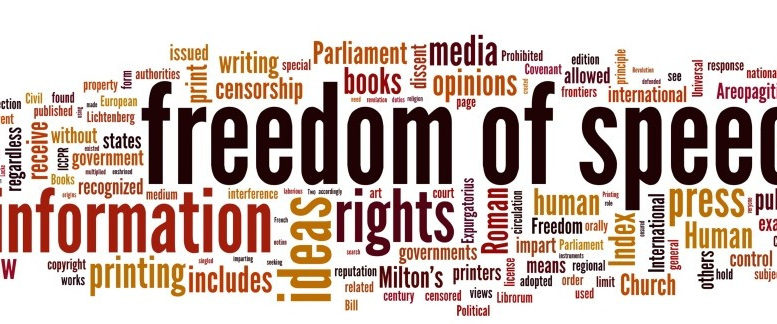


2d 298 (1981), the Court upheld regulations limiting the sale or distribution of religious materials to fixed locations on state fair grounds. International Society for Krishna Consciousness, 452 U.S.
FREEDOM OF SPEECH FREE
The government may impose more restrictions on free speech in limited public forums than in traditional public forums. For example, state fair grounds are public premises that have not traditionally served as public forums. 2d 661 ).Īn important distinction is drawn between public premises that serve as traditional public forums and those that constitute limited public forums.

It is not necessary that a content-neutral law be the least restrictive alternative, but only that the government's interest would be achieved less effectively without it ( Ward v. These so-called content-neutral laws are permissible if they serve a significant government interest and allow ample alternative channels of communication (see Perry). Laws that regulate the time, manner, and place, but not content, of speech in a public forum receive less scrutiny by the Court than do laws that restrict the content of expression.
FREEDOM OF SPEECH FULL
Restrictions on speech in a public forum also may be upheld if the expressive activity being regulated is of a type that is not entitled to full First Amendment protection, such as Obscenity. If the law regulates the content of the expression, it must serve a compelling state interest and must be narrowly written to achieve that interest ( Perry Education Ass'n v. Supreme Court examines whether the regulation restricts the content of the speech or merely regulates the time, manner, and place in which the speech is delivered. When the government attempts to regulate the exercise of speech rights in traditional public forums, such as parks or public sidewalks, the U.S. At the same time, the Court has granted protection to some areas of expression that the Framers clearly had not contemplated. Supreme Court has held that some types of speech or expression may be regulated. 470 ).ĭuring the two centuries since the adoption of the First Amendment, the U.S. To illustrate this point, Holmes wrote, "The most stringent protection of free speech would not protect a man in falsely shouting fire in a theater and causing a panic" ( schenck v. citizens, agree with Justice oliver wendell holmes jr., who felt that the Constitution allows some restrictions on speech under certain circumstances. black, have believed that freedom of speech is absolute. The Framers of the Constitution guaranteed freedom of speech and expression to the citizens of the United States with the First Amendment, which reads, in part, "Congress shall make no law … abridging the freedom of speech." Almost since the adoption of the Bill of Rights, however, the judiciary has struggled to define speech and expression and the extent to which freedom of speech should be protected. The dilemma dates back at least to ancient Greece, when the Athenians, who cherished individual freedom, nevertheless prosecuted Socrates for his teachings, claiming that he had corrupted young people and insulted the gods. Constitution, to express beliefs and ideas without unwarranted government restriction.ĭemocracies have long grappled with the issue of the limits, if any, to place on the expression of ideas and beliefs. The right, guaranteed by the First Amendment to the U.S.


 0 kommentar(er)
0 kommentar(er)
